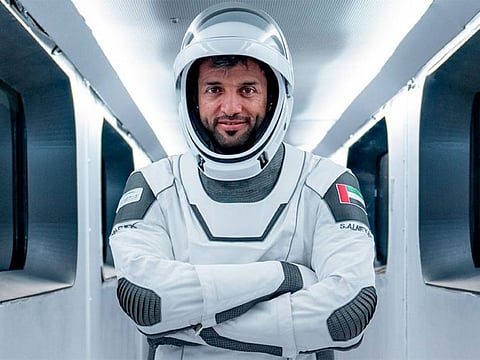Arab space programmes are skyrocketing
Investing in STEM education crucial to nurture potential of next generation of innovators

Since time immemorial, mankind has been entranced by the boundless mysteries of outer space. Throughout history, Arab scientists made significant discoveries and contributions to the field of space exploration, serving as launch pads for modern inventions.
To illustrate, in the 8th century, the Caliph al-Mamun al-Rashid ordered the establishment of the first astronomical observatory in the Islamic world, within the renowned House of Wisdom.
On the other hand, the pioneering 10th century Syrian female astronomer, Mariam Al-Astrulabi, perfected the usage of astrolabes; instruments which are used to calculate the altitude of celestial bodies in the sky. It is no wonder that, today, more than 165 stars have names of Arabic origin and 24 craters on the moon are named after prominent Muslim astronomers.
The fascination with space exploration remains riveting, with the Arab world investing heavily in world-class space programmes. More recently, the Arab world’s first interplanetary mission to Mars, led by the UAE’s “Hope” probe, made headline news with the UAE becoming the fifth nation in history to reach Mars.
The probe aims to facilitate research discovery on a number of pivotal scientific enquiries regarding the Red Planet’s atmosphere and transmit critical information for scientists to access. There is much present buzz surrounding Dr. Sultan Al Neyadi, the UAE’s second Emirati astronaut to travel into space.
He is currently on a 6-month long mission on the International Space Station, charged with conducting some 200 experiments for Nasa and 19 experiments for universities in the UAE. In May, he will be joined by two Saudi astronauts, including the first Arab woman in space, Rayyanah Barnawi.
Such developments raise many important questions on how to stay ahead of the curve in the fast pace of space exploration. Governments looking to compete in the space sector will need to channel investments in the areas of talent development.
On this note, the education system should be bolstered with an engaging STEM education, embracing new pedagogical approaches to inspire students to pursue related careers and be equipped as early as possible with essential skills to be competent in these fields. Budding scientists can be nurtured from early childhood and partnering with keen parents is a critical first step towards achieving that goal.
A wealth of child-friendly space content is available for parents to leverage within the home environment and daily family life. Examples include children’s clubs, books, toys, activities, workshops, games, trainings, and documentaries.
In tandem, parents can tap into an abundant online world to find fantastic resources, such as the Smithsonian Science Education Center, European Space Agency Kids, and Nasa Space Place — all of which are worth translating for an Arab audience. For more immersive and interactive experiences, parents can accompany their children to children’s clubs, dedicated space academies, space museums, and observatories.
In tandem with this engagement is the importance of regular positive messaging and encouragement about pursuing careers in the space sector. When done well, these efforts could greatly influence children’s forays into STEM-related career paths.
This path is further given momentum during the school years, where students have an opportunity to fully immerse in an engaging learning experience when it comes to STEM subjects. Increased focus should be shifted towards upgrading teachers’ competencies via special professional training programs that equip them with the skills to deliver exciting and relevant space-related classes, with a special emphasis on encouraging students to pursue advanced STEM courses.
Shaping students’ academic interests
Students’ educational experiences could be elevated to be more experimental, hands-on, and collaborative in order to nurture essential skills, such as analytical thinking, problem-solving, inquisitiveness, independent thinking, and imagination. Teachers should also encourage students to participate in after-school extra-curricular activities or school holiday programmes, in addition to taking part in space-themed projects, contests, and exhibitions.
Career counsellors play a critical role in shaping students’ academic interests by offering practical advice on pursuing higher education and career pathways in the space sector. They can also organise meaningful contact with astronomers to inspire students with successful role models and mentors within this sector.
At university, offering world-class space programmes can boost talent pools in the sector. Mentoring programmes can have an indelible influence on inspiring and supporting students to pursue space-related careers by sharing practical and empathetic guidance to navigate academia and the workplace. Furthermore, offering students opportunities to participate in global exchange programs and attend conferences can also improve their capabilities.
Also Read: Arab world has a rich tapestry of traditions
Future U Programme
The portrayal of successful astronomers in mass media is also another a fantastic way of inspiring budding scientists to contemplate careers as astronomers. In the future, governments can unlock the full potential of space-related discoveries by investing in groundbreaking research projects, led by teams of talented innovators.
A fascinating case study on embedding space studies within the national curriculum can be gleaned from Australia, where the Boeing Company helped to design enthralling lesson plans targeting years 7-10 students at two pilot schools.
Dubbed as the Future U Program, the Boeing staff, in collaboration with schoolteachers, delivered a series of classes which enabled students to immerse in the world of space, to understand first-hand its practicalities and scenarios, to shed light on the nuances of pursuing a space career pathway, and to take part in space-related experiments.
Arabs are making remarkable and significant strides in the fields of space exploration. Governments that effectively put in place a suite of supportive policies and programmes are well placed to succeed in the space sector and will see a trail of feats in this field.
Sara Al-Mulla is an Emirati civil servant with an interest in human development policy and literature


